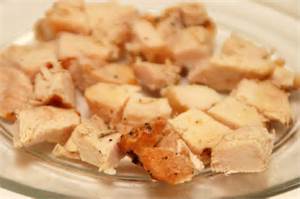Dehydrating Chicken

Dehydrating chicken is one way to keep this versatile meat in your pantry in case of an emergency but you will need to learn how to dehydrate it yourself. Commercially preserved chicken, such that Provident Pantry and the ReadyStore offer, is freeze dried chicken and chicken meals rather than dehydrated products.
Types of Chicken
People use a variety of chicken meat including fresh, canned and chicken that is in pouches, but you should be very careful if you dehydrate raw chicken due to possible contamination such as salmonella as well as E. coli.
Those who follow primitive cooking, whereby the chicken is cured then dried with cold air, claim the meat stays edible as long as pests don't get into it. The United States Department of Agriculture (USDA) recommends curing the raw chicken, precooking it to 165 degrees and then drying it to assure killing any and all bacteria.
Canned chicken also makes a flavorful dehydrated chicken, but it sometimes has high sodium content due to the canning process. Draining the liquid off the chicken can reduce some of the sodium content of your dehydrated chicken.
Raw chicken cooked with a pressure cooker is one of the best methods for dehydrating chicken. The proponents of this method claim the chicken is the most flavorful as the method keeps the flavor in the meat as opposed to boiling where some of the flavor escapes in the water. If you cook the chicken yourself, you can add whatever seasoning appeals to you and your family, and keep out any additives that you don't feel necessary.
Preparation
You need to choose whether you will cook your chicken, if so whether you will pressure-cook, boil or bake it or, if you will use canned or pouched chicken. If you cook the chicken, you need to remove fat and bones and you need to let it cool. Once it has cooled, you follow the same steps as using already cooked chicken and you:
- Press the chicken to squeeze as much moisture from the chicken as possible, especially if you have boiled the chicken.
- Cut the chicken in slices that will fit on your dehydrating trays. It is best to cut the chicken as thin as you can, as that will decrease the drying time. You can dice the chicken if you prefer.
- Arrange the chicken on the trays being sure the slices do not overlap.
- The suggested temperature for dehydrating chicken is 130 to 145 degrees Fahrenheit or 54 to 63 degrees Celsius.
- Allow the chicken to cool after dehydrating and the texture should be crunchy and the color should be brown.
You can use commercial dehydrators such as Nesco or Excalibur or you can build your own solar or sun powered dehydrators for dehydrating chicken.
Storage
If you use plastic bags to hold your dehydrated chicken, you should store them in the freezer. The people, who cold dry their raw chicken, store their chicken in paper bags in a dry, clean area. Some preppers store their chicken in mason jars, using canning methods. If you choose canning, you should put a 200-300 cc O2 absorber, and check to be sure the jars successfully sealed.
Canned chicken should keep for years, although some insist you should use it within a year. As with all your provisions, you should use the oldest dehydrated chicken first and check for any broken seals or signs of spoilage before consuming it.
Uses
It takes hours to rehydrate the chicken, which is one of the reasons some use the freeze-dried chicken, which rehydrates much more quickly. However, using the dehydrated chicken in soups and stews allows the flavors to blend while the chicken rehydrates.
Dehydrating chicken is work but you can provide yourself and your family with nutritious food and you know what is in it and how it was processed. It provides a good source of protein if food supplies are interrupted for whatever reason.
Return from Dehydrating Chicken to DIY Food Storage





New! Comments
Have your say about what you just read! Leave me a comment in the box below.